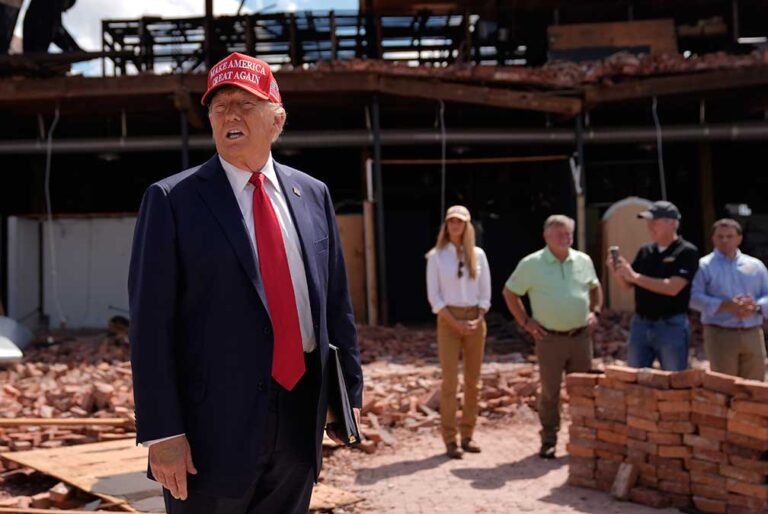As many expected, November 5, 2024, was a day that will, as they say, go down in history.
In the 2024 U.S. presidential election, Donald Trump soundly defeated Vice President Kamala Harris, following a campaign that will likely be the subject of scrutiny, analysis and dissection for decades to come.
What does version 2.0 of the Trump administration mean for trucking?
The answer to that question — and the many other questions related to it — could hold answers on both ends of the conservative-liberal spectrum.
Changes at the USDOT
To start, let’s look at Trump’s choice to lead the U.S. Department of Transportation (DOT). In November, he selected former Wisconsin Rep. Sean Duffy, a Republican, for the role of Secretary of Transportation.
According to reports from the Associated Press and other news sources, Duffy is a former reality TV star and Fox News personality, and he was one of Trump’s most visible defenders on cable news.
He served in the U.S. House for nearly nine years and was a member of the Financial Services Committee and chairman of the subcommittee on insurance and housing. He left Congress in 2019. He was co-host of “The Bottom Line” on Fox Business when Trump named him as his choice for head of the USDOT on November 18, 2024.
In his announcement, Trump noted that Duffy is married to a fellow Fox News host, describing him as “the husband of a wonderful woman, Rachel Campos-Duffy, a STAR on Fox News.”
A spokesperson for Fox News Media wished Duffy “the best of luck in his return to Washington,” noting that Duffy resigned his position with the company following Trump’s announcement.
Trump says Duffy will use his experience and relationships built over the years in Congress “to maintain and rebuild our Nation’s Infrastructure, and fulfill our Mission of ushering in The Golden Age of Travel, focusing on Safety, Efficiency, and Innovation. Importantly, he will greatly elevate the Travel Experience for all Americans!”
In 2022, Duffy had ruled out a run for the governorship of Wisconsin despite pleas from Trump, saying he needed to care for his nine children, including his youngest child who had a heart condition.
What about the surge of the EV market?
Trump’s campaign was partially built on becoming energy independent, which was evident by his adoption of the “drill, baby, drill” slogan, referring to plans to increase the nation’s production of oil and petroleum products.
However, the emergence of Tesla founder Elon Musk as Trump’s pseudo right hand has created a question of whether Trump and his administration will be more open than expected to the advancement of the electric vehicle (EV) market.
The freight industry has been rife with controversy about looming emissions regulations and the use of EVs for long-haul trucking, as well as about autonomous driving technology.
Beth Osborne, a former U.S. Senate staffer and USDOT executive who now leads the advocacy group Transportation for America, has had a front-row seat to transportation policymaking under every president since George W. Bush.
Last fall, she sat down with David Zipper of Bloomberg News and answered a few questions about the transportation landscape under President-elect Trump.
One of those questions related to Musk.
“Trump has often disparaged electric vehicles, but his influential ally Elon Musk runs a company that manufactures them. Does that create an opportunity for electrification?” Zipper asked.
“It does, Osborne replied. “With Musk as a shadow cabinet member, I don’t think Trump’s team will do anything that he doesn’t want. I think that Musk will be happy to see the federal government continue to build out EV charging stations, for instance.”
Musk’s presence could be problematic in other areas as well.
A November 21 report from the Associated Press posited that Musk could bring a Constitutional clash regarding government efficiency and balance of power.
When Musk first suggested a new effort to cut the size of government, Trump didn’t seem to take it seriously. His eventual name for the idea sounded like a joke, too — the Department of Government Efficiency, or DOGE, a reference to an online meme featuring a surprised-looking dog from Japan.
But now that Trump has won the election, Musk’s dreams of government downsizing is closer to becoming reality, with the potential to spark a constitutional clash over the balance of power in Washington.
Trump put Musk, the world’s richest man, and Vivek Ramaswamy, an entrepreneur and former Republican presidential candidate, in charge of the new “DOGE,” which is really an outside advisory committee that will work with people inside the government to reduce spending and regulations.
Musk and Ramaswamy have said they’ll encourage Trump to make cuts by refusing to spend money allocated by Congress, a process known as impounding. The proposal goes against a 1974 law intended to prevent future presidents from following in the footsteps of Richard Nixon, who held back funding from projects he didn’t like.
“We are prepared for the onslaught from entrenched interests in Washington,” Musk and Ramaswamy wrote in an opinion piece for The Wall Street Journal. “We expect to prevail. Now is the moment for decisive action.”
What will Trump 2.0 bring?
That brings us to the question on the mind of pretty much every executive in the industry: What will trucking look like under the Trump Administration?
The answer? “Different.” At least that’s what Bloomberg news gleaned during Zipper’s interview with Osborne.
Questions included the subject of highways and how they might be funded in the next four years.
One question regarding highway infrastructure asked how realistic it might be to terminate competitive grant programs like RAISE that “allocate billions of dollars to state and local governments for high-priority projects.”
Osborne’s response:
“I don’t think Congress will let the Trump administration get rid of competitive programs, because legislators get so much credit for that spending,” she said. “Federal formula programs just go to the states, and the states do what they want. But for the competitive grant programs, Congress gets a notification about new awards, and they have three days to do whatever event around them that they wish.
“Basically, Project 2025 was suggesting that Congress never get credit for federal spending in infrastructure again,” she continued. “Maybe that sounded good to the Heritage Foundation, but there’s a lot of Project 2025 that is divorced from the reality of how anything happens in the real world.”
Another question from Zipper’s interview:
“Let’s talk about road and vehicle safety. Under the previous Trump administration, road safety seemed like an afterthought. The National Highway Transportation Safety Administration didn’t get a Senate-confirmed administrator, USDOT said virtually nothing about surging crash deaths, and companies were encouraged to experiment with self-driving technology on public roads. Under Biden, issues like oversized cars and autonomous vehicle regulation have gotten at least some attention. I find it hard to believe that continues under Trump, but perhaps you believe otherwise.”
In addition to noting that she doesn’t believe Trump’s policies on vehicle safety isn’t as different from Biden’s as it should be, Osborne issued a warning in her response. She believed the administration “will go after California, which now can set more stringent emissions standards than the feds.”
“I think they’ll aim to kill that exception. In general, it’s a lot easier for a new administration to change vehicle regulations than to adjust how infrastructure is funded because that requires an act of Congress,” she added.
Certainly, Donald Trump’s previous policies regarding trucking have been beneficial for the most part, but only time will tell what Trump 2.0 will bring.
Bruce Guthrie is an award-winning journalist who has lived in three states including Arkansas, Missouri and Georgia. During his nearly 20-year career, Bruce has served as managing editor and sports editor for numerous publications. He and his wife, Dana, who is also a journalist, are based in Carrollton, Georgia.







